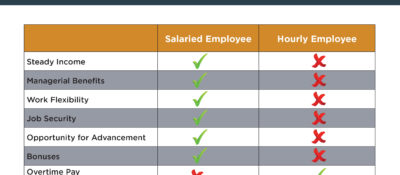When you have a job there are a lot of ways to get paid. You can punch a clock, work on commission, or have a salary. There are a lot of advantages to being a salaried worker. Salaried workers enjoy a steady income, full time benefits like health care and paid vacation, and more security in times of economic uncertainty. It’s also usually one of the first steps to climbing the corporate ladder.
When you’re an hourly employee your wages rise and fall based on the hours you work. However, hourly workers are eligible for higher overtime pay for time worked above 40 hours in a single week. Now the US government is going to require that all salaried employees who make less than $47,500 a year be paid overtime for hours worked over 40 in a week. Sounds good right?
Well for the employee that has gone the extra mile to finally get to a salaried position, there may be unintended consequences that end up costing the people it was designed to help.
Consider the hypothetical case for Larry. Larry has worked for an auto parts distributor for several years, and was recently promoted from hourly to salary as a result of his hard work and going the extra mile. This new position allows him flexibility, provides additional job security, and consistent income.
Because of the new overtime rule, his boss was forced to bump him down to hourly pay, and limit his hours to 40 per week. When sales aren’t as strong Larry’s hours get cut to 35 hours in order to save money.
So while he is now eligible for overtime pay his income isn’t guaranteed, and it’s harder to go for that promotion.
Larry can’t blame his boss. When business owners get hit with an expensive regulation they usually have two choices: raise prices on their products, or try and cut labor costs.
Because it punishes job creators, the overtime rule hurts those they serve including customers, workers, and job seekers. Government policies should encourage job creators to hire and retain employees, giving everyone a chance to pursue the American dream.
For more information about how government regulations affect you, visit InformationStation.org.






